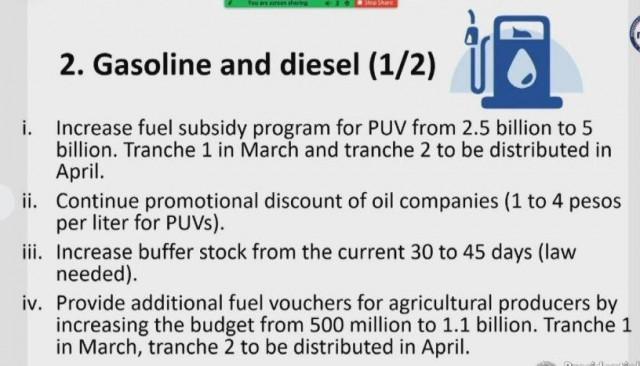NEDA wants to double fuel subsidy for PUVs, new law to boost fuel stocks
The Philippines is eyeing to raise the fuel subsidy for public utility vehicles from P2.5 billion to P5 billion to cushion the impact of spiraling oil prices aggravated by the conflict between Russia and Ukraine.
In his report to President Rodrigo Duterte on Monday’s Talk to the People, National Economic Development Authority (NEDA) Secretary Karl Chua said the first tranche of the subsidy is targeted to be distributed in March and the second tranche in April this year.
Economic managers also proposed to shift the entire country to Alert Level 1 and to open schools for face-to-face classes “to increase domestic economy and offset global risk.”
They also pushed for additional fuel vouchers for agricultural producers by increasing the budget from P500 million to P1.1 billion, for distribution in March and April 2022.
Chua said there is also a need to increase the country's oil buffer stock from the current 30 to 45 days, which he said would need a law.

The Economic Development Cluster bared during the briefing 14 proposed interventions in response to the economic impact of the Russia-Ukraine crisis.
On the calls by several lawmakers to suspend the excise tax on oil, Chua said the action of Congress is needed to address the matter. Congress is currently on break for the campaign period.
The Department of Education (DepEd) on Wednesday said a total of 6,145 public schools are ready for its progressive expansion phase of the limited face-to-face classes as of February 22.
A total of 4,315 schools, including 4,239 public and 76 private schools, have already started the implementation of in-person classes as of Wednesday.
According to the DepEd, there are around 47,000 public schools and 12,000 private schools in the country.
The cluster also pitched for the full implementation of service contracting and its expansion to all public transport routes.
To soften the impact of the price hikes on consumers, Chua said the buffer stock of liquefied petroleum gas (LPG) or cooking gas should also be increased from the current seven days to 15 days, but for which a law is also needed.
On the pork supply, the economic managers suggested extending the lower tariff of 15 percent in quota and 25 percent out quota with the minimum access volume of 200,000 metric tons until December 2022. They also pushed to accelerate the release of imported pork from cold storage.
On fish, the need to issue certificate of necessity to import for small pelagic fish such as galunggong was underscored, which will be valid from the second quarter up to the fourth quarter of the year. The cluster said the country needs an additional 140,000 metric tons to fill up the projected supply gap of 200,000 metric tons.—LDF, GMA News




